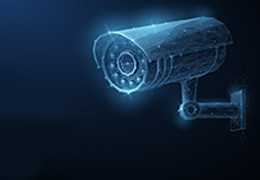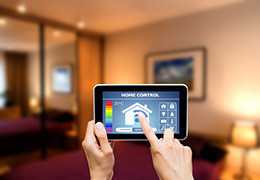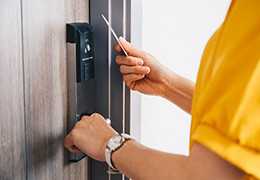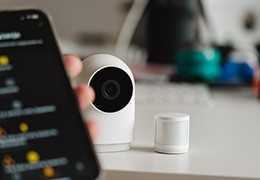In today's world, the safety of our homes and the peace of mind that comes with it are paramount. With the advancement of technology, outdoor security cameras have become a crucial tool in safeguarding our residences. The year 2024 has seen significant innovations in this field, offering homeowners a variety of options to suit their specific needs. In this comprehensive guide, we delve into the best outdoor security cameras available, ensuring you make an informed decision to protect your home.
The Evolution of Outdoor Security Cameras
The landscape of home security has evolved dramatically, with outdoor security cameras now featuring higher resolution, smarter detection algorithms, and more seamless integration with home automation systems. These advancements not only enhance the quality of surveillance but also ensure that homeowners can monitor their premises with ease and precision.
Top Picks for the Year
When it comes to selecting the best outdoor security camera for your home, there are several factors to consider, including image quality, storage options, smart features, and weather resistance. Based on these criteria, we have curated a list of top contenders that stand out in 2024.
1. The Ultra-Resolution Guardian
Boasting an impressive 4K video resolution, this camera offers unparalleled clarity, allowing you to capture even the minutest details with precision. Its built-in motion tracking technology ensures that any activity is accurately monitored, making it an ideal choice for those seeking high-level surveillance.
2. The Night Vision Innovator
With advanced night vision capabilities, this camera ensures that your home is monitored around the clock. Its infrared sensors provide clear footage even in complete darkness, ensuring that no incident goes unnoticed.
3. The Weatherproof Warrior
Designed to withstand extreme weather conditions, this camera is perfect for homeowners living in areas prone to harsh weather. Its durable construction ensures that it remains operational in temperatures ranging from freezing cold to scorching heat, providing reliable surveillance regardless of the climate.
4. The Smart Detection Specialist
This camera integrates cutting-edge AI technology to distinguish between different types of movements, reducing false alarms caused by pets or passing cars. Its smart detection features also include facial recognition, providing an added layer of security by identifying known and unknown visitors.
5. The Seamless Integrator
For those invested in smart home ecosystems, this camera offers seamless integration with various home automation platforms. Its compatibility with voice assistants and mobile apps ensures that you can access live feeds and receive alerts wherever you are, making home surveillance more convenient than ever.
Installation and Maintenance Tips
To maximize the effectiveness of your outdoor security camera, proper installation and maintenance are key. Ensure that cameras are placed at strategic locations around your home, such as entry points and areas with limited visibility. Regular maintenance, including cleaning the lens and checking for firmware updates, will keep your camera functioning optimally.
Enhancing Home Security
In addition to installing outdoor security cameras, consider complementing them with other security measures such as motion sensor lights, alarm systems, and secure locks. A layered approach to home security can significantly deter potential intruders and provide comprehensive protection for your home.
Conclusion
Choosing the right outdoor security camera is a critical step in safeguarding your home. With the advancements in technology, homeowners now have access to a wide range of options tailored to their specific needs. Whether you prioritize ultra-high resolution, advanced night vision, weather resistance, smart detection, or seamless integration with home automation, there is a camera on the market that meets your requirements. By selecting one of the top picks for 2024 and following best practices for installation and maintenance, you can enhance the security of your home and enjoy peace of mind.
FAQs
1. What is Phishing?
Phishing is a fraudulent attempt to obtain sensitive information such as usernames, passwords, and credit card details by disguising oneself as a trustworthy entity in an electronic communication. Always verify the source before clicking on links or providing personal information.
2. How Can I Create a Strong Password?
A strong password should be at least 12 characters long, include a mix of letters (both uppercase and lowercase), numbers, and symbols. Avoid using easily guessable information like your name or birthdate. Consider using a passphrase or a password manager to generate and store complex passwords.
3. What is Two-Factor Authentication (2FA)?
Two-Factor Authentication adds an extra layer of security by requiring not only a password and username but also something that only the user has on them, i.e., a piece of information only they should know or have immediately to hand - such as a physical token.
4. How Can I Protect My Privacy Online?
Protect your privacy by managing your social media settings, using privacy-focused browsers and search engines, and being cautious about the information you share online. Regularly review the permissions you've given to apps and websites.
5. What is a VPN, and Why Should I Use One?
A Virtual Private Network (VPN) extends a private network across a public network, allowing users to send and receive data across shared or public networks as if their computing devices were directly connected to the private network. This enhances security and privacy, especially on public Wi-Fi networks.
6. How Do I Know If a Website is Secure?
Check the URL of the website. If it begins with "https" instead of "http," it means the site is secured using an SSL Certificate (the s stands for secure). SSL certificates secure all of your data as it is passed from your browser to the website's server.
7. What Are Cookies, and Should I Be Concerned About Them?
Cookies are small files which are stored on a user's computer. They are designed to hold a modest amount of data specific to a particular client and website and can be accessed either by the web server or the client computer. While generally harmless, some cookies can be used to track browsing habits for advertising purposes. Use cookie management tools and privacy settings to manage your preferences.
8. How Can I Avoid Online Scams?
Be skeptical of unsolicited messages or emails, especially those asking for personal or financial information. Verify the authenticity of requests by contacting the company directly using official contact details. Do not click on suspicious links or download attachments from unknown sources.
9. What Should I Do If My Personal Information Is Leaked Online?
Immediately change your passwords and secure your accounts with two-factor authentication. Monitor your financial transactions and credit report for any unauthorized activity. Consider reaching out to affected services to inquire about additional steps to protect your identity.
10. How Often Should I Update My Software and Why?
Regularly update your software, including your operating system, browser, and any installed apps. Updates often include patches for security vulnerabilities that have been discovered since the last version. Keeping your software up to date is crucial in protecting your device from malware and other security threats.
 Beyond Convenience: How Smart Devices Can Enhance Home Security03/28/2024Posted in: GuideRead more
Beyond Convenience: How Smart Devices Can Enhance Home Security03/28/2024Posted in: GuideRead more The Ultimate Smart Home Starter Kit: Must-Haves for Beginners (Affordability Edition)03/28/2024Posted in: GuideRead more
The Ultimate Smart Home Starter Kit: Must-Haves for Beginners (Affordability Edition)03/28/2024Posted in: GuideRead more Illuminate Your Life: Home Lighting Automation Explained03/28/2024Posted in: Smart HomeRead more
Illuminate Your Life: Home Lighting Automation Explained03/28/2024Posted in: Smart HomeRead more
 Enhance Your Home Security with a Smart Lock: The Ultimate Guide03/28/2024Posted in: Smart HomeRead more
Enhance Your Home Security with a Smart Lock: The Ultimate Guide03/28/2024Posted in: Smart HomeRead more
 The Ultimate Guide to Home Automation Hubs02/12/2024Posted in: Smart HomeHome automation...Read more
The Ultimate Guide to Home Automation Hubs02/12/2024Posted in: Smart HomeHome automation...Read more Enhance Your Security: Smart Home Solutions02/12/2024Posted in: Smart HomeIn today's...Read more
Enhance Your Security: Smart Home Solutions02/12/2024Posted in: Smart HomeIn today's...Read more Smart Light Compatibility: Ensuring Seamless Integration02/12/2024Posted in: Smart LightingIn the realm of...Read more
Smart Light Compatibility: Ensuring Seamless Integration02/12/2024Posted in: Smart LightingIn the realm of...Read more
 Beyond Convenience: How Smart Devices Can Enhance Home Security03/28/2024Posted in: GuideSmart home...Read more
Beyond Convenience: How Smart Devices Can Enhance Home Security03/28/2024Posted in: GuideSmart home...Read more The Ultimate Smart Home Starter Kit: Must-Haves for Beginners (Affordability Edition)03/28/2024Posted in: GuideTurn your home...Read more
The Ultimate Smart Home Starter Kit: Must-Haves for Beginners (Affordability Edition)03/28/2024Posted in: GuideTurn your home...Read more Illuminate Your Life: Home Lighting Automation Explained03/28/2024Posted in: Smart HomeThis guide...Read more
Illuminate Your Life: Home Lighting Automation Explained03/28/2024Posted in: Smart HomeThis guide...Read more
 Enhance Your Home Security with a Smart Lock: The Ultimate Guide03/28/2024Posted in: Smart HomeThis guide...Read more
Enhance Your Home Security with a Smart Lock: The Ultimate Guide03/28/2024Posted in: Smart HomeThis guide...Read more





Leave a comment